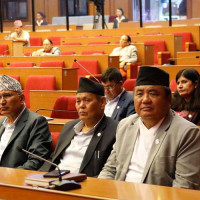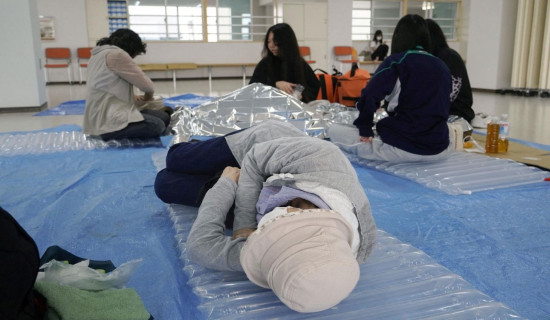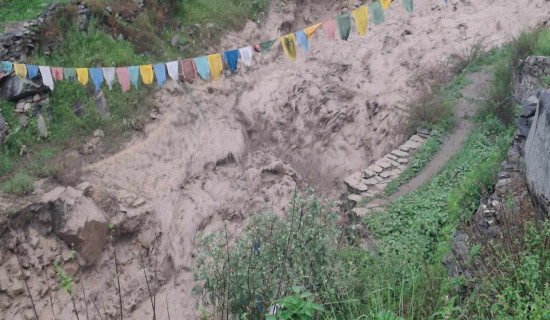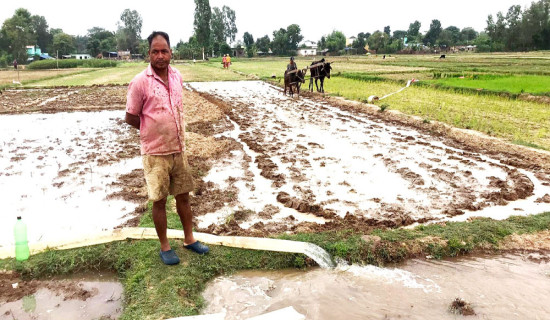- Thursday, 31 July 2025
Break Silence, Let People Heal
Throughout history, society has told men they must be strong and unemotional and hide their feelings. Boys hear phrases from an early age, like "Be a man!" or "Why are you crying? "Are you a girl?" and "Real men do not cry!" These ideas, repeated by family, friends, media, and religious teachings, create the belief that toughness defines manhood. In South Asia, in India, Pakistan, Bangladesh, and Nepal, these expectations grow even stronger because of cultural norms based on patriarchal traditions. These traditions view men as protectors and providers who must suppress their emotions to maintain honour and strength. However, this strict standard is expensive, and we must reconsider how we support men's emotional well-being. My father, who is 65, told me something that hit me. He had never cried over a loss before, but during my Fupu's daughter's cremation ceremony at the ghat, tears ran down his face. Later, he said, "I had not cried at the ghat before, but I could not stop myself this time. Maybe it is because I am getting older." His sudden show of weakness, a rare departure from a lifetime of keeping his feelings in check, touched me to my core. It pushed me to pen something pressing. I saw that we do not need a single "Men's Day" each year to tackle men's emotional battles; we need a change in our culture in South Asia, where keeping quiet only worsens a hidden problem.
Cost of silence
The World Health Organisation (2022) reports that men take their own lives at double the rate of women across the globe. South Asia faces a dire situation. A 2020 systematic review and meta-analysis looked at depression and suicidal behaviour in eight South Asian nations, including Afghanistan, Bangladesh, Bhutan, India, the Maldives, Nepal, Pakistan, and Sri Lanka. It found a combined prevalence of depression among those who attempted or took their own life. According to Arafat et al. (2020), though the rates fall below those in Western countries, they remain notable, with 6.4 per cent of people showing suicidal behaviours. In India, male suicide rates exceed those of females.
Man, from the get-go, boys get hammered with this whole "do not cry, suck it up" nonsense. It is bad everywhere, sure, but in South Asia? Oh boy, it is like being wrapped in a straitjacket made of family honour and collective reputation. If you are in Pakistan or India, you get handed a script at birth: "Put the family first, hide your feelings, and if you ever cry, God forbid, you are shaming your ancestors." I mean, look at Bollywood. Every hero has to be this stone-faced, macho dude who never sheds a tear unless it is raining and dramatic, and even then, he is probably bleeding out or something. Crying? No, that is for the "weak", or worse, "like a girl".
I have watched my friends fall apart, ugly cry in front of me, and then immediately apologise by saying stuff like, "Do not be a weeping little girl, man." It is as if feeling something makes you less of a dude. It is wild. That kind of thinking? It is fear dressed up as tradition. Moreover, honestly, it takes a lot to admit you are hurting. Like, what is so masculine about pretending you are a robot? Here is the kicker: All this emotional lockdown is not just about bruised egos; it is wrecking people's health, and I am not even exaggerating. Bottling up your feelings – fancy folks call it "repressive coping" – literally messes with your body. We are talking about the immune system hitting the gutter, higher chances of heart attacks, stress, anxiety, depression, you name it. Moreover, with heart disease running rampant, it is not just a small problem. Urban guys especially get struck; everyone is hustling, everyone's stressed, and nobody is allowed to, you know, feel stuff.
Meanwhile, crying is nature's pressure valve. It helps you bond, gets you support, and lets you breathe for a second. In the '90s, poet Robert Bly was doing these wild men's groups in America, telling guys to get in touch with their sadness, like crying in public. That is rare in South Asia, almost unheard of. However, can you imagine if schools and families here gave boys half a chance to feel what they feel instead of shoving it all down? That would be a revolution, honestly. Maybe one day.
Wellness crisis
It is puzzling how the tears of a man are often seen as a weakness, while conflict and violence are viewed as courageous. This is an even bigger concern in South Asia, where cultural norms worsen the problem. As mentioned in Ahmed et al. 2017, in Nepal and Sri Lanka, the collectivist approach leads families to ignore mental health and shame, seeking help, causing men to languish in silence. The modern principles of social equity and fairness seem obliterated by the sight of a sobbing man labelled "unmanly". The consequences of emotional repression impact mental well-being alone; there is also a risk of chronic ailments. Often referred to as hypermasculinity, the conditioning to "act like a man" causes men to neglect their health issues. This phenomenon can be observed throughout India, Pakistan, Nepal, and Bangladesh, where men postpone treatment for chronic conditions such as heart disease or depression, resulting in increased mortality rates. In the attempt to curb suicide in the region, it is critical to address socio-economic stressors like poverty, unemployment, rapid urbanisation, and depression. However, that stigma is still intact. Take India, for example, where the criminalisation of suicide up until 2017 has led to underreporting and, subsequently, obscured the accurate scale of the problem. Psychiatrist Sanjay Chugh sums it up beautifully: "It is natural for men to cry. They eat, drink, and procreate—why not cry? Tears signal a need to address something, or it festers into physical symptoms." Holding back tears does not safeguard men; it puts them at greater risk.
A new way
It is time for a revolution for the next generation. Crying is not a "female trait" exclusive to women, and the "emotional" label for the so-called fragile girls is equally harmful. The South Asian region needs this shift, considering the rigid norms attached to culture. In Nepal and other such countries, families, schools, and communities must foster spaces where boys can express grief without shame. Here, the media and policymakers can intervene by celebrating public figures, athletes, actors, and leaders candidly discussing their pain, proving that vulnerability signifies strength. For every father, partner, son, brother, and male companion: If you need to cry, do so freely; if you must vent, feel free to. Moreover, if rage ushers tears, let the tears fall. As a society, we all need to cry and let it out, whether we are boys, girls, women, or men. Letting tears flow should be embraced as a sign of strength, not weakness. Emotions make us human, and crying does not strip that away from men. There are actionable ways to tackle this. Encourage open conversations at home, weave emotional literacy into school curricula, and support mental health initiatives from groups and alliances to help reduce stigma.
This is not solely a crisis for South Asia but rather a global issue. However, the situation is even more critical in Nepal, where cultural and economic forces intertwine. We need to strive for an environment in which men have the freedom to cry and heal. We should care for men's feelings by encouraging them to weep, listening empathically, and providing appropriate help, including essential support. Men need help. Whether it involves a shoulder to lean on, an honest dialogue, or counselling, their health, mental, physical, and emotional well-being defines the health of our families, communities, and nations.
(Karki is a social activist.)







-square-thumb.jpg)









